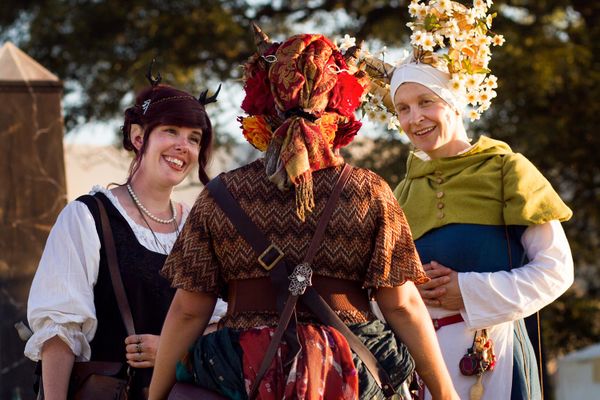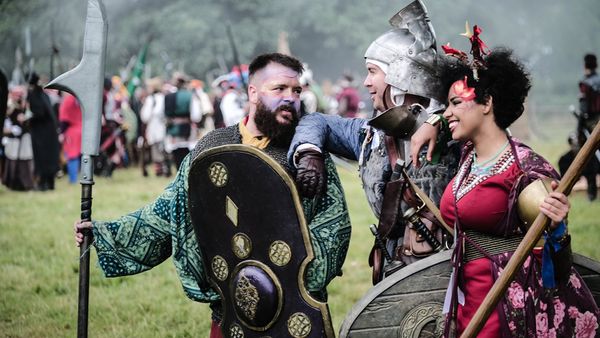Game overview
This is an old page whose content has been superseded by pages such as the setting and the game
Introduction
The game is set in a powerful Empire that is surrounded by hostile barbarians. After centuries of relative prosperity, the Empire experienced a decline. Internecine conflict and weak leadership led to several territories being overrun by barbarian invasion that an Empire focused on internal politics was ill-equipped to repulse.
The game began shortly after the death of Empress Britta, leaving the collective player base as the most powerful individuals in the Empire. Since then, the Empire has begun to restore the Empire to its former glory, and lay the groundwork for surpassing the successes of the past.
The Empire is formed from ten culturally distinct nations. Each nation has its own culture and customs but they are politically and legally unified. Although the players are all fundamentally on the same side there is rivalry between nations, with players competing with each other to lead the Empire and achieve their own goals.
A single religion unites the Empire. Priests of the Way guide their fellow citizens along the Paths of Virtue and wield potent political power through the Synod. They must remain ever vigilant against heretics, blasphemers, and idolators who seek to undermine the faith and steal the Empire's destiny.
Events represent the moments when the powerful and significant members of the Empire come together to shape its future. These are times when characters can take bold actions - political manoeuvring to advance one's agenda in the Senate, Synod, Conclave, and Military Council; opportunities to practice powerful magic; chances to make your fortune or gain a lucrative seat on the Bourse; and forays through the Sentinel Gate - battles on skirmishes to be fought that will determine the outcome of the Empire's military campaigns or quests in pursuit of more personal goals.
Look and feel
The inspiration for the setting is drawn from the late Byzantine period to the early Renaissance era. In creating the visual styles for the nations we have been inspired by some of the images from the Lord of the Rings movies, the Assassin's Creed and Dragon Age computer games, HBO Borgias and the Game of Thrones television series, the Starz Camelot series and even the BBC Merlin series.
The setting and the style of the game has also been influenced by modern fantasy literature, especially the highly political worlds of Jim Butcher's Codex Alera and Joe Abercrombie's The First Law.
The game is not a historical setting; history is just one of the starting points that has been used to create the distinctive looks and the culture of each nation. We want players to create characters and wear costume that fits the setting and their part within it. To help with this the wiki includes extensive information about each nation, the costumes that are appropriate and advice on how to create the right look. The goal is for everyone involved to be ambitious and work together to create a game that looks stunning and sets new standards for immersion.
The nations of the Empire
The Empire is formed from ten culturally distinct nations. Nations exist to provide the players with their primary source of identity - in the way that players in other fest systems are Malathians, Greeks or Lions, our players are Highborn or Navarr. The game is organised logistically along nation lines, with camps laid out for each nation. Nationality has no rules impact on a character’s skills or abilities, because we want to encourage players to choose their nation purely for its aesthetic and setting rather than for reasons of optimisation.
Nations are not politically independent, but they have a cultural identity that is identifiable and reflected in their dress, customs and attitude. The Empire has a single set of laws that applies to each citizen, and each nation elects senators to represent its political interests as well as generals to direct its armies in service to the Empire.
The Senate
Political control of the Empire is primarily through the Senate. Each nation selects its own senators, each one of whom serves for a year before facing re-election. Senators vote on motions and make decisions that affect the Empire directly. The debates and business of the Senate is facilitated and administered by our NPC Civil Service and officiated by the Speaker for the Senate. Even with the Throne occupied by Imperatrix Lisabetta, the Senate continues to have a vital role in shaping the future of the Empire.
The point of the Senate is to provide a focus for political conflict between characters. It gives PCs the levers to control the Empire - but in uptime, rather than in downtime.
The Synod
The Empire has an official state religion called the Way which revolves around the practice of the seven Virtues. Synod is a political body and meeting place for the faithful of the Empire. It serves as the moral conscience of the Empire, but also possesses potent political powers supported by the Imperial Constitution. Membership of the Synod is open to all priests of the Way with a congregation (represented by a personal resource). The Synod is guided in part by the Cardinals who make up the Assembly of the Nine.
The Synod has several powers including the ability to veto the decisions of the Senate, to call Imperial citizens before it to answer questions about their actions, and ultimately to dismiss senators and generals it deems to be corrupt or unvirtuous. They are also the only body able to intercede with the judiciary to plead for clemency for convicted criminals.
The Military Council
The Military Council is run by the generals who oversee war and conflict with the Empire's enemies. A position in the Military will give a character influence over the wars the Empire fights against their barbarian enemies, as well as the battles that take place at each event.
The Conclave
The Imperial Conclave is a political arena for the powerful wizards in the Empire. The six Archmages, and the Grandmasters of the Orders are the most prominent titles associated with the Conclave, but any magician can participate in it. Titles in the Conclave are associated with magical prowess and power and characters involved in the Conclave will be able to shape the magical destiny of the Empire.
The Bourse
The Imperial Bourse is an arena for characters who are interested in trade and commerce. A position in the Bourse allows characters control of valuable resources that can be used to influence the economic development of the Empire. Unlike the other four houses of power, the Bourse does not have meetings or wield political power directly - the influence of those able to claim a seat on the Bourse either by purchasing it at auction or being appointed by their fellow citizens comes from control of the four extremely valuable materials. Only through the Bourse can one acquire large amounts of the scarce mithril, weirwood, white granite, and ilium.
The Throne
There are many Imperial titles in the Empire, and the Senate has the ability to create new ones. The single most influential title is that of the Throne - commonly referred to as Emperor or Empress. They have extensive powers in the other houses of government, but must lead the Empire rather than rule it. Like all other positions of significant political power in the Empire, the Throne is always a Player Character. The most recent Throne was Imperatrix Lisabetta, who was appointed after several years of politicking in 380YE.
The Senate is responsible for appointing the Throne, and the Synod has the power to remove them from office. The game is also designed to be able to function without a Throne, but they possess certain powers that are not available when the position is empty.
The Civil Service and magistrates
The Empire has an efficient and orderly civil service that helps administer the Empire. These are NPC roles played by crew. Their job is to facilitate the player leadership and keep the game immersive and challenging. They present details of the setting to the players in a purely IC manner, bringing onto the field aspects of the game that might otherwise have required referees, print outs or computers. The Civil Service lets the players enjoy the challenge of controlling an empire without getting bogged down in the bureaucratic details of administering an empire.
The Civil Service will also perform tasks such as managing meetings in the Senate, holding trials for accused parties and presenting intelligence to help the generals choose which battle opportunities to pursue. The Civil Service makes it possible for us to recognize what players are doing, and to ensure that their actions and decisions are reflected in the game world. The NPC Civil Service carry out a wide range of logistical functions, without being in charge.
The Magistrates are a specific branch of the Civil Service whose role is to enforce the law. Laws are created by the players in the Senate, but enforced by our NPC magistrates. PCs can be directly involved in the legal process, gathering evidence and arresting suspects, but trials will be conducted and judged by our NPCs. This ensures that breaking the law is meaningful and credibly dangerous, as well as keeping the resulting trials short and interesting.
Eternals
The world of Empire is known to touch six other planes of existence. These are home to magical entities called eternals, some of whom are interested in the human world. Players - especially the Archmages of the Conclave - can meet and negotiate with the eternals and their representatives. The eternals are not gods but possess magical powers that players may be able to draw upon to advance their own agendas. They have their own motivations and personalities, however, and characters who encounter them must always be careful about what they agree to.
Lineage
The majority of the Empire's population are normal humans. Some, however, manifest one of the six distinct lineages that set them somewhat apart from their neighbours. Lineage represents a supernatural quality in a human character's make-up. This quality might be due to supernatural blood in their ancestry. or represent exposure to powerful magic. The strength of lineage varies between individuals. Each has a list of roleplaying and physical trappings that offer guidance on how to portray the lineage. The more of the trappings the player adopts for their character, the less like a human their character becomes.
Ultimately characters with lineage are still human, however, and lineage has no impact on a character’s skills or abilities. Some lineages are more accepted than others, and some nations are prejudiced against certain lineages.
Lineage fills the role that race often plays in fantasy games. Only human characters have Lineage - orc characters specifically do not.
Barbarians
Barbarians are people who are not part of the Empire, that the Empire is currently at war with. There are several distinct barbarian powers which represent hostile nations. The barbarians are designed to look cool in massive numbers in battles, to provide immersive, exciting and dramatic combat encounters, and to allow a range of interactions outside of combat. Most of the barbarian powers that currently surround the Empire are orcs. Players are not able to play barbarian characters - by definition, they are not welcome on the playing field.
Orcs
Players are able to play Imperial Orcs. Imperial orcs are those orcs who were brought into the Empire decades ago. As such, they are politically assimilated and loyal to the Empire. Imperial orcs have their own unique culture; they are a nation of their own. The orcs have only recently gained a homeland of their own and are still deciding what exactly it means to be part of the Empire.
Other species exist in the world, but players may only create human or Imperial Orc characters.
Foreign Nations
Foreigners are people that are not part of the Empire, that the Empire is not currently at war with. The Empire trades with many of these foreign powers, and may host delegations from them. There are two basic classifications of foreigner - the local foreigners whose nations lie close to Imperial territory and the distant foreigners who equal the Empire in power but lie far beyond Imperial borders. Foreigners do not directly influence the future of the Empire, but they possess economic and diplomatic powers that can influence it from afar. The Senate appoints Ambassadors to many of these nations, and these players represent the Empire on the international stage. Each nation has its own political agendas, philosophies, and goals that guide their interaction with the players.
It is not possible to play a foreigner as a character, but it is acceptable to play a character who was born in a foreign nation and has since become part of one of the Imperial nations.
Heroes of the Empire
The game allows the heroes of Anvil to make use of the ancient arcane device known as the Sentinel Gate to access specific magical conjunctions that allow travel to far flung locations around the Empire. By using these conjunctions, players are able to respond to threats from the barbarians, assist imperilled citizens, explore hidden locations, or meet with individuals who would not normally travel to Anvil.
Many of these conjunctions are tracked by the Civil Service. The information they provide is disseminated by the War Scouts to assist players in preparing for short engagements known as skirmishes. These encounters normally last 20 minutes and pit players against threats portrayed by our Skirmish team. They might involve rescuing injured soldiers, striking against orc encampments, or wielding strategic magic.
Twice per summit the Military Council can send much larger Imperial forces from the combined nations into battle against large formations of barbarian troops to achieve great victories or avoid crushing defeats, altering how campaign can unravel. These battles allow players to clash in heroic combat both as their characters and as barbarian orcs.
Technology
While the basic technology of the game is aimed at a magical-medieval tone, there are a few things that go beyond the historical equivalents in the setting. The technology page lays out some of the important elements of common technology in the Empire that distinguish the setting from historical Europe. Most of these additions are designed to provide in-character explanations for real world technology - to make the setting fit the game better.
It is important to note that Empire is not a game of technological exploration - technological advancement and invention are not themes of the game. This means that you cannot invent binoculars by putting two spyglasses together - this is against the spirit of the game and would fail if you tried it. Substances like gunpowder are not part of our setting and cannot be researched or discovered.


